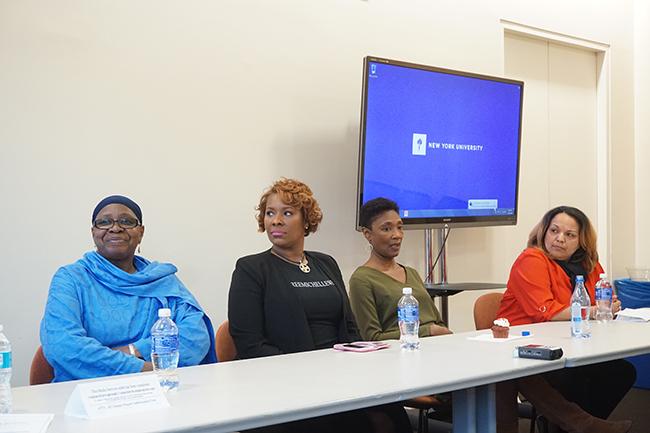Formerly Incarcerated Women Talk the Penal System
As a part of NYU’s Women’s Herstory Month, the Incarceration to Education Coalition hosted a panel with formerly incarcerated women to share their stories.
March 24, 2016
The Incarceration to Education Coalition and Women’s Herstory month hosted a panel discussion on Wednesday evening with formerly incarcerated women about their experiences with the punishment system and how the penal system affects communities.
The women involved in the panel were Anisha Sabur, the project associate for the Correctional Association’s women in prison project; Topeka Sam, founder of Ladies of Hope Ministries; Jacqueline Torres, a case manager at Montefiore Medical Center and Tina Reynolds co-founder and chair of Women on the Rise of Telling Herstory.
The event opened with informative videos about the conditions women face behind bars, the failure of correctional systems to protect its LGBT members and the brutal and illegal act of shackling incarcerated pregnant women. Some of these women have experienced such mistreatment while pregnant and incarcerated and have since been working on the anti-shackling movement.
Reynolds detailed the experience of having her son while in prison in 1994 and said being shackled during her delivery changed her perspective on advocacy for women in prison.
“I was shackled and I was handcuffed during birth and delivery [and] transport to and from the prison,” Reynolds said. “I started thinking, not for myself, I started thinking if this is happening to me, how many women has it happened to before me, and how many people was it going to continue to happen to after me?”
After Reynolds was released, she began to work with the Correctional Association and spoke against shackling. Ten years later in 2009, a New York State anti-shackling bill was passed in New York state and Reynolds said the bill succeeded because of its visibility.
However, the issue was not fully resolved. Sabur talked about the issues of illegal shackling that continue to happen despite the bill being passed.
“The issue was implementation to make sure the department of correction was following that law,” Sabur said.
Only when a survey was conducted to assess women’s health in the prison system was it found that many women are still being illegally shackled. However, after many efforts the bill was expanded in 2015 to protect incarcerated women throughout the duration of their pregnancy, and as of Monday the bill became a law in New York State.
The event concluded with the panelists discussing their work in bringing awareness to the conditions inside women’s prisons. Sam said she felt that advocacy was the path for her ever since she was released in May. She explained that before she was incarcerated she didn’t know what was truly happening.
“[Women’s experience] in incarceration looks completely different than it is for men,” Sam said. “The things that women have to go through are completely different. The real women who have been through the real thing, we’re the ones that can change the policy because we know what’s right.”
Email Imani Johnson at [email protected].

























































































































































Marie • Mar 25, 2016 at 6:40 pm
Great coverage and truly an important issue to cover. Thanks for bringing awareness. Rehabilitation should be enforced not mistreatment. I’m curious to find out more about the health concerns of the pregnant incarcerated women .